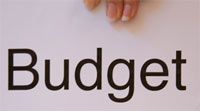Is A Zero Based Budget Right For You?
One of the budgeting techniques that has gained some popularity in recent years is the zero based budget. In this budget, you make sure that every dollar is accounted for at the beginning of the month. You look at what you expect to get in terms of a paycheck, and then use every penny to pay bills, or accomplish your goals. As part of your budget, you decide what will go to debt reduction, or to building an emergency fund, or to your retirement account. You can also put money toward a vacation or some other goal, on top of making sure your groceries, gas, insurance premiums and other expenses are covered. Every dollar of income is assigned to a spending, saving or giving category. No dollar remains un-assigned.
A zero based budget is also expected to help you manage your cash flow. You match up expenses with your paychecks so that you can see when to pay your bills, dividing expenses into first of the month costs and end of the month costs. You can make the process a little easier with the help of bill scheduling so that your credit card payments, utility bills and other expenses are paid automatically — on a day that works best for you.
Is A Zero Based Budget For Everyone?
 While I know people who swear by the zero based budget, I admit that it kind of makes me nervous. This type of budget doesn’t really account for leaving a cushion (although I suppose you could budget in a cushion one month, and then it would be there for the future). I like to have extra money in my checking account at the end of the month, even after I’ve contributed to retirement and short term savings. It doesn’t need to be a lot of money in the checking account, but I like to have a little something in there.
While I know people who swear by the zero based budget, I admit that it kind of makes me nervous. This type of budget doesn’t really account for leaving a cushion (although I suppose you could budget in a cushion one month, and then it would be there for the future). I like to have extra money in my checking account at the end of the month, even after I’ve contributed to retirement and short term savings. It doesn’t need to be a lot of money in the checking account, but I like to have a little something in there.
Another issue with the zero based budget, at least for me, is that I don’t have a regular income. My income is variable. Trying to figure out exactly what I will make each month, and then matching it up with expenses, doesn’t work for me, since my exact income depends on which projects I am doing, and whether I have extra money that month — or less coming in. Of course there is the option of faking a regular paycheck when you have an irregular income.
Instead of using a zero based budget, I prefer to create a more general spending plan. I figure out how much I need each month for regular expenses that are important spending priorities. Fixed expenses, like insurance premiums, the mortgage payment, car payment, IRA contributions and utilities, are all taken care of first, via automatic withdrawal or by using bill scheduling. Then I spend on other things that I want or need for the month. I track my income and spending, so that I don’t exceed what I make, but I don’t create a budget to limit what I can spend on entertainment, dining out, charity or other variable expenses.
In the end, how you decide to spend your money is up to you. But it does help to have a plan. Think about what sort of plan would work best for you, whether it’s a zero based budget, or some other type of spending plan. As long as my most important expenses are covered, and my future provided for, I don’t worry too much about where I spend my other money, as long as it reflects my priorities.
What about you? Do you have a preferred budgeting technique?
Related Posts
The post Is A Zero Based Budget Right For You? appeared first on Smart On Money and was written by Miranda Marquit.
Copyright © Smart On Money – please visit smartonmoney.com for more great content.
SOURCE: Smart On Money – Read entire story here.


